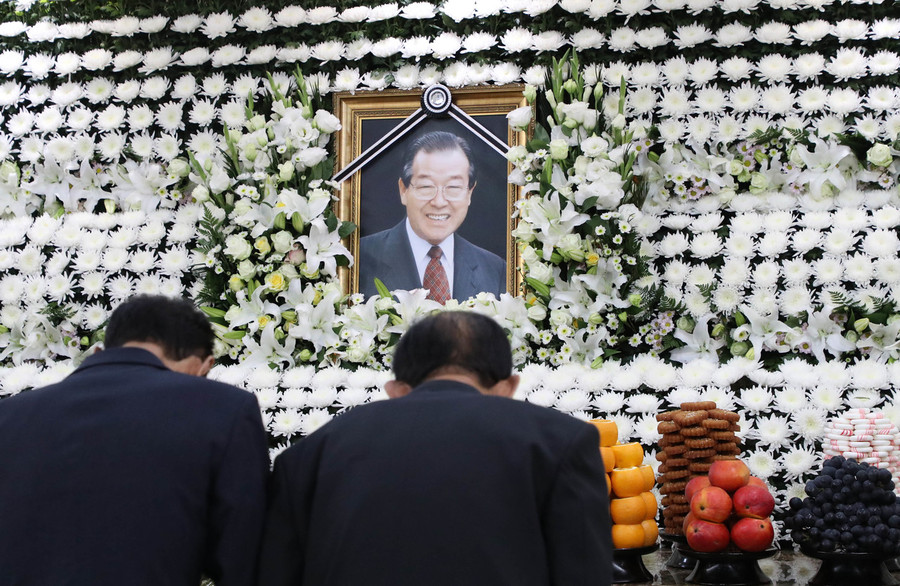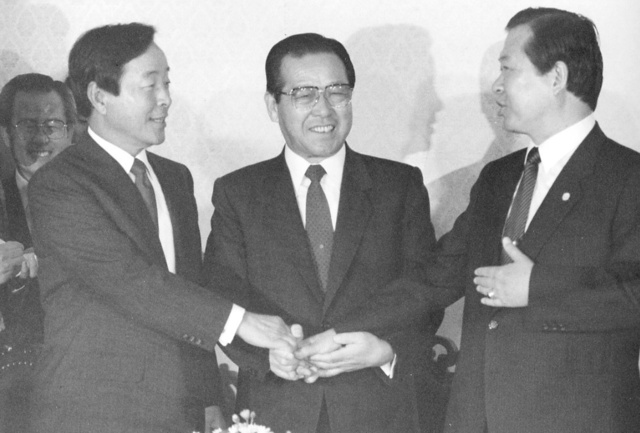Posted on : Jun.25,2018 17:05 KST
Modified on : Jun.25,2018 17:25 KST
 |
|
Mourners attend the funeral of former Prime Minister Kim Jong-pil, who passed away on June 23, at Asan Medical Center in Seoul on June 24. (Yonhap News)
|
Kim Jong-pil, former prime minister of South Korea, has been laid to rest at the end of a tumultuous life. Politicians heaped praise upon him for the huge contribution he made both to industrialization and democratization. The government has also announced its plan to bestow the Mugunghwa Medal – the most prestigious of the country’s medals – upon Kim. Better known by his nickname “JP,” Kim’s life was a mixture of distinction and disgrace, as reflected by his various epithets -- “forever No. 2,” “peerless politician” and “worldly wiseman.”
Along with former presidents Kim Dae-jung and Kim Young-sam, Kim Jong-pil was one of Korea’s famous “three Kims,” and he left a huge mark on Korea’s modern history. He played a considerable role in advancing industrialization during the government-led economic development of the 1960s and 1970s. Kim Jong-pil also did his part to help South Korean politics mature. During the presidential election in 1997, he allied himself with Kim Dae-jung – a merger dubbed “DJP,” from the combination of Dae-jung (DJ) and Jong-pil (JP) – to shepherd the country’s first peaceful handover of power to an opposing party. He also criticized former president Park Geun-hye in 2016 after news broke of the influence-peddling scandal involving Park’s confidante Choi Soon-shil, remarking that Park had only inherited the negative qualities of her father Park Chung-hee and her mother Yuk Young-soo.
But the shadow cast by Kim Jong-pil is much longer and darker. On May 16, 1961, Kim, then a lieutenant colonel in the army, launched a coup with Park Chung-hee, his wife’s uncle. It was Kim who established the Korean Central Intelligence Agency, a symbol of the suppression of the Apr. 19 Revolution and the abuse of human rights, and served as its first director; and it was Kim who spearheaded the creation of the Democratic Republican Party, paving the way to Park’s dictatorship during the Yushin period.
The KCIA was responsible for a wide range of misconduct, including torture, fabricating evidence and the kidnapping of Kim Dae-jung. Kim Jong-pil served as prime minister for four years and six months around the time that the Yushin regime was declared in Oct. 1972. The hasty settlement of South Koreans’ claims for compensation against Japan that Kim negotiated while normalizing diplomatic relations with Japan in 1964 provoked angry demonstrations on June 3 of that year, and this remains a stumbling block for South Korea-Japan relations even today.
 |
|
Oct. 9, 1989 From the right are pictured Kim Dae-jung, president of the Party for Peace and Democracy, and Kim Jong-pil, president of Democratic Republic Party, who met on Oct. 9, 1989, to discuss the politics of Chung Doo-hwan’s military government. (Hankyoreh archives)
|
After establishing the New Democratic Republican Party and running for president in 1987, Kim Jong-pil provoked and exploited regional rivalries. The merger of three major parties led by Kim Jong-pil, Roh Tae-woo and Kim Young-sam in 1990 set up a confrontation between the juggernaut of the Democratic Liberal Party and the Party for Peace and Democracy, which was based in the southwest Honam region, and ensured the political ascendancy of conservatives in the southeast Yeongnam region. After leaving the Democratic Liberal Party, Kim Jong-pil founded the United Liberal Democrats and whipped up regional resentment in Chungcheong Province during the June 27 local elections. This made him the political kingpin of the Chungcheong region and extended his political career.
Kim Jong-pil breathed his last just ten days after the June 13 local elections, in which South Koreans broke with their traditional regional loyalties. The Liberty Korea Party, which had relied on its hegemony in the Yeongnam region, was nearly annihilated in the elections, with the Democratic Party winning mayoral elections in Busan and Ulsan and taking the governor’s house in South Gyeongsang Province.
There is nothing blameworthy about honoring the memory of one of the most influential politicians of his age. It is doubtful, however, whether Kim Jong-pil should be awarded the nation’s highest medal. The government may have been thinking that this could symbolize unity. But before making its final decision, it ought to take into consideration public opposition to the medal, including a petition posted to the Blue House website.
Please direct comments or questions to [english@hani.co.kr]










